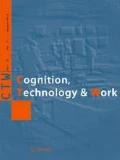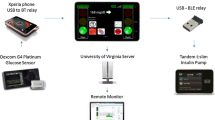Abstract
Type II diabetes occurs when the body’s natural blood glucose regulatory system breaks down. Elevated blood glucose can lead to disabilities, early deaths, and enormous societal expense. While medical and pharmacological science offers powerful approaches for controlling blood glucose levels and ameliorating dangerous consequences, the patient must make most critical day-to-day decisions. Diabetes self-management education is widespread and typically depends on training rules and procedures. Our research identified a pervasive gap between existing educational programs and the real, dynamic challenges that patients face. While simple, well-defined tasks can be managed with rules and procedures, dynamics ones require much more. We describe glucose level management as analogous to the regulation of other complex systems. Patients must control their diet and exercise to achieve a safe blood glucose level and must use physiological feedback and blood glucose monitoring to make corrections when facing illness, stress, or other difficulties. Our research demonstrated that people who had adopted a control model were more likely to maintain healthy blood glucose levels. They had better understanding of diagnostic tools and were able to use the information provided to maintain healthy blood glucose levels. Patients, like others who must control complex systems, are most resilient when they can detect problems, identify problem sources, monitor and interpret outcomes, and generate plausible management plans. While not all people will be able to use this approach, this study suggests that it can assist many people in managing their Type II diabetes.
Similar content being viewed by others
References
Centers for Disease Control and Prevention (2011) 2011 National diabetes fact sheet. Retrieved 23 May 2011. http://www.cdc.gov/diabetes/pubs/estimates11.htm#12
Chi MTH, Feltovich PJ, Glaser R (1981) Categorization and representation of physics problems by experts and novices. Cogn Sci 5:121–152
Chi MTH, Glaser R, Farr MJ (1988) The nature of expertise. Lawrence Erlbaum, Hillsdale
Collins A, Ferguson W (1993) Epistemic forms and epistemic games: structures and strategies to guide inquiry. Educ Psychol 28(1):25–42
Crandall B, Klein G, Hoffman RR (2006) Working minds: a practitioner’s guide to cognitive task analysis. MIT Press, Cambridge
Dreyfus HL (1972) What computers can’t do: a critique of artificial reason. Harper and Row, New York
Dreyfus HL, Dreyfus SE (1986) Mind over machine: the power of human intuition and expertise in the era of the computer. Free Press, New York
Ericsson KA, Charness N (1994) Expert performance: its structure and acquisition. Am Psychol 49(8):725–747
Ericsson KA, Krampe RTh, Tescher-Römer C (1993) The role of deliberate practice in the acquisition of expert performance. Psychol Rev 100(3):363–406
Farmer A, Gibson JO, Tarassenko L, Neil A (2005) A systematic review of telemedicine interventions to support blood glucose self-monitoring in diabetes. Diabetes Med 22(10):1372–1378. Retrieved 5 July 2009 from http://www3.interscience.wiley.com/cgi-bin/fulltext/118699778/H
Fauconnier G (2001) Conceptual blending and analogy. In: Gentner D, Holyoak KJ, Kokinov BN (eds) The analogical mind: perspectives from cognitive science. MIT Press, Cambridge, pp 255–285
Feldman DH (1994) Beyond universals in cognitive development, 2nd edn. Ablex, Norwood
Feldman H, Fowler RC (1997) The nature(s) of developmental change: Piaget, Vygotsky, and the transition process. New Ideas Psychol 15(3):195–210
Forbus K (2001) Exploring analogy in the large. In: Gentner D, Holyoak KJ, Kokinov BN (eds) The analogical mind: perspectives from cognitive science. MIT Press, Cambridge, pp 23–58
Gentner D, Stevens AL (eds) (1983) Mental models. Lawrence Erlbaum Associates, Hillsdale
Gentner D, Holyoak KJ, Kokinov BN (2001) The analogical mind: perspectives from cognitive science. MIT Press, Cambridge
Gosbee LL (2010) Chronic disease management: improving continuity of care with human factors engineering. Hum Fact Ergon Soc Annu Meet Proc Health Care 54(12):919–923
Hmelo-Silver CE, Pfeffer MG (2004) Comparing expert and novice understanding of a complex system from the perspective of structures, behaviors, and functions. Cogn Sci 28:127–138
Hollnagel E, Woods DD (1983) Cognitive systems engineering: new wine in new bottles. Int J Man Mach Stud Arch 18(6):583–600 (Academic Press Ltd., London, UK)
Klein G (1999) Sources of power: how people make decisions. MIT Press, London
Klein HA, Lippa K (2008) Type II diabetes self-management: controlling a dynamic system. J Cogn Eng Decis Mak 2:48–62
Klein HA, Meininger AR (2004) Self management of medication and diabetes: cognitive control. IEEE Trans Syst Man Cybernet 34(6):718–725
Klein DE, Wustrack G, Schwartz A (2006) Medication adherence: many conditions, a common problem. Proc Hum Fact Ergon Soc, San Francisco, CA 50:1088–1092
Lippa KD (2006) Diabetes self-management: patient cognition and the development expertise. Unpublished masters thesis, Wright State University, Dayton, Ohio
Lippa KD, Klein HA (2008) Portraits of patient adherence: what cognitive science tells us about diabetes self-care. Can J Nurs Res 40:80–95
Lippa KD, Klein HA, Shalin VL (2008) Everyday expertise: cognitive demands in diabetes self-management. Hum Factor 50:112–120
Militello LG, Domenguez CO, Lintern G, Klein G (2009) The role of cognitive systems engineering in the system engineering design process. Syst Eng. doi:10.1002/sys.20147
National Diabetes Information Clearinghouse (2011) National diabetes statistics, 2011. Retrieved 17 May 2011 from http://diabetes.niddk.nih.gov/dm/pubs/statistics/
Piaget J (1926/2001). Language and thought of the child. Routledge, London
Roth EM (2008) Uncovering the requirements of cognitive work. Hum Factors 50:475–480
von Wartburg L (2007) The sad state of diabetes in America compliance. Retrieved 6 July 2009 from http://www.diabeteshealth.com/read/2007/05/19/5202/the-sad-state-of-diabetes-complications-in-america
Vygotsky LS (1978) Mind in society (trans: Cole M, Scribner S, John-Steiner V, Souderman E, eds). Harvard University Press, Cambridge
Vygotsky LS (1986) Thought and language (trans: Kozulin A, ed). MIT Press, Cambridge
Author information
Authors and Affiliations
Corresponding author
Rights and permissions
About this article
Cite this article
Klein, H.A., Lippa, K.D. Assuming control after system failure: type II diabetes self-management. Cogn Tech Work 14, 243–251 (2012). https://doi.org/10.1007/s10111-011-0206-3
Received:
Accepted:
Published:
Issue Date:
DOI: https://doi.org/10.1007/s10111-011-0206-3



